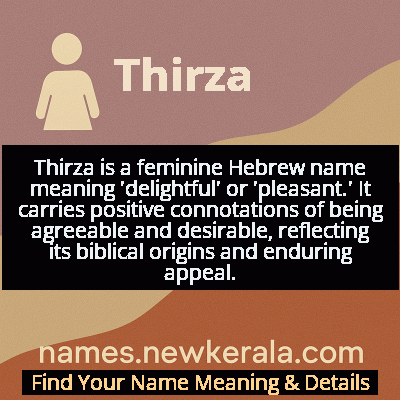Thirza Name Meaning & Details
Origin, Popularity, Numerology Analysis & Name Meaning of Thirza
Discover the origin, meaning, and cultural significance of the name THIRZA. Delve into its historical roots and explore the lasting impact it has had on communities and traditions.
Name
Thirza
Gender
Female
Origin
Hebrew
Lucky Number
1
Meaning of the Name - Thirza
Thirza is a feminine Hebrew name meaning 'delightful' or 'pleasant.' It carries positive connotations of being agreeable and desirable, reflecting its biblical origins and enduring appeal.
Thirza - Complete Numerology Analysis
Your Numerology Number
Based on Pythagorean Numerology System
Ruling Planet
Sun
Positive Nature
Leaders, ambitious, highly driven, self-reliant, innovative.
Negative Traits
Overly aggressive, domineering, impatient, selfish.
Lucky Colours
Red, orange, gold.
Lucky Days
Sunday.
Lucky Stones
Ruby, garnet.
Harmony Numbers
2, 3, 9.
Best Suited Professions
Entrepreneurs, managers, engineers.
What People Like About You
Courage, determination, leadership.
Famous People Named Thirza
Thirza Schaap
Photographer and Artist
Known for her 'Plastic Ocean' series highlighting marine pollution through artistic photography
Thirza Cuthand
Filmmaker and Artist
Indigenous Canadian filmmaker exploring queer and mental health themes in her work
Thirza Smith
Actress
British stage and television actress known for her roles in 1960s British dramas
Thirza D. Defoe
Dancer and Educator
Native American dancer and cultural educator preserving traditional Indigenous dance forms
Name Variations & International Equivalents
Click on blue names to explore their detailed meanings. Gray names with will be available soon.
Cultural & Historical Significance
During the Protestant Reformation and Puritan movements, Thirza experienced a revival as parents sought biblical names with positive meanings, and it became particularly popular among Dutch and English Protestant communities who valued its combination of scriptural authenticity and pleasant meaning. The name's usage spread through religious texts and family Bibles, often chosen for daughters as a way to honor both biblical heritage and the qualities of pleasantness and grace. In more recent times, the name has maintained a presence in communities that value traditional biblical names while also appealing to parents seeking less common alternatives to more popular biblical names like Sarah or Rebecca.
Extended Personality Analysis
Individuals named Thirza are often perceived as having a gentle yet determined character, reflecting the name's meaning of 'delightful' combined with the biblical Tirzah's legacy of advocacy. They typically exhibit a balanced personality that combines warmth and approachability with quiet strength and conviction. This combination often makes them effective communicators who can persuade others through reason and empathy rather than force.
The historical association with the biblical figure who courageously challenged traditional inheritance laws suggests a personality capable of standing up for principles while maintaining grace and diplomacy. Thirzas are often described as having an inner resilience that allows them to navigate challenges with poise, and they tend to be deeply loyal to family and causes they believe in. Their 'delightful' nature manifests in their ability to bring joy to others while maintaining serious purpose when circumstances require it, creating a personality that is both comforting and inspiring to those around them. This blend of qualities often makes them natural peacemakers and trusted advisors in their social circles.
Modern Usage & Popularity
In contemporary times, Thirza remains a relatively uncommon but cherished name, particularly among families with Hebrew or Christian traditions who appreciate its biblical heritage and pleasant meaning. The name has experienced modest revivals during periods of renewed interest in vintage and biblical names, though it has never reached the popularity levels of more common biblical names like Sarah or Rachel. In the Netherlands, Thirza maintains stronger usage due to historical Protestant influences, while in English-speaking countries it's often chosen by parents seeking a distinctive yet traditional name. Recent decades have seen the name adopted by some parents attracted to its unique sound and positive meaning, though it remains outside the top 1000 names in most Western countries. The spelling variation 'Tirzah' has gained some traction in literary and artistic circles, contributing to the name's continued, if niche, presence in modern naming practices.
Symbolic & Spiritual Meanings
Symbolically, Thirza represents the harmonious balance between gentleness and strength, drawing from both its literal meaning of 'delightful' and the biblical narrative of advocacy and inheritance rights. The name carries connotations of graceful determination—the ability to effect change through persuasion and principle rather than aggression. It symbolizes inherited wisdom and the preservation of family legacy, reflecting the biblical story where the original Tirzah secured her family's continuity. In a broader sense, Thirza represents the idea that pleasantness and strength are not mutually exclusive qualities, but can coexist powerfully in an individual. The name also carries symbolic weight as a representation of feminine agency within tradition, embodying the concept of working within established systems to create meaningful change while maintaining respect for heritage and custom.

